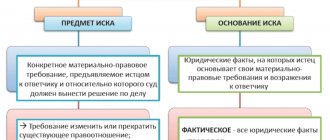Article updated: March 25, 2021
Alexey BessonovPracticing Moscow lawyer
Hello. I am a visiting lawyer from the Bessonov and Partners law firm. I specialize in discharging citizens in court.
Any person can be discharged from an apartment without his consent ONLY THROUGH THE COURT. This is written in paragraph 1 of Art. 35 Housing Code of the Russian Federation, in paragraphs. 5 (e) clause 31 of Government Decree No. 713 of July 17, 1995 and Art. 7 of the Law of June 25, 1993 N 5242-1. There is NO other way.
If the ex-wife, who is not the owner, refuses to sign out, ignores this requirement, or there is no contact with her, you need to file a claim with the court to terminate the rights to use the residential premises and obtain a court decision. How to do this and under what conditions is described in detail below.
The ex-wife can be discharged, but the child can be left behind. But I also have separate instructions - how to expel your ex-wife and children from your apartment.
Important: All owners must agree to the ex-wife’s release and report this to the court. If one of them tells the judge about his disagreement, the claim may be rejected.
Is it possible to expel my ex-husband from the apartment?
In some situations, the husband’s discharge is carried out without taking into account the opinion of the former companion, in others, conditions are required for the alienation of his right to use property.
Laws, codes and acts regulating the right of residence:
- Housing Code of the Russian Federation.
- Civil Code.
- Law of the Russian Federation on the right of movement of citizens (dated 06/25/1993 N 5242-1).
The wife who purchased the apartment or inherited it before marriage is considered the sole owner of the property. After the husband's registration, he retains only the right to use the property .
According to the Housing Code of the Russian Federation, Article 31, after the dissolution of the marriage relationship, the husband automatically loses the right to reside in the apartment . If housing was purchased during marriage, then the husband receives an equal share. It is difficult to discharge such a cohabitant without a trial after a divorce.
The legal basis to evict a husband by court decision opens after his refusal to pay off debt on utility bills for a period of more than six months (LC RF, Article 90). We discussed in more detail the question of how you can discharge a person who does not pay for it from an apartment here.
In order for the court to take into account this claim, it is necessary to provide receipts for payment for services; if the husband did not deposit the money, then he will not have it.
To simplify payment of utility bills, you need to divide your personal account.
About settlement by agreement in case of divorce
After former relatives separate, the property owner has a great desire to evict the former spouse.
According to the housing code, you can discharge your “ex-other half” by concluding an oral peace agreement.
This method is acceptable for those married couples who were able to maintain friendly relations after a divorce. For such ex-spouses, it is enough to simply talk among themselves, give reasons why one of them needs to be discharged at the place of previous residence.
How to remove a spouse from registration?
The deregistration procedure depends on the legal status of the housing and other conditions.
From privatized housing
If the husband does not intend to create obstacles, then he can independently remove himself from the registration register at the place of new residence.
Discharge procedure:
- the husband applies to the passport office or the Federal Migration Service;
- the applicant submits a written request for discharge;
- the employee simultaneously deregisters and issues a new registration.
We talk about how the process of checkout from one apartment and registration into another takes place in this material. With this form of extract, ownership rights remain with the husband if the property was acquired during marriage.
Through the court
At the court hearing, the husband's possibility of moving to relatives or living in another place is examined . If the husband also owns another home, then a positive decision can be made in 1 meeting. Afterwards, the defendant has the right to appeal the decision within 1 month. If the husband did not leave the apartment voluntarily, then the plaintiff (wife) has the right to contact the bailiffs.
If he is not the owner
If a husband does not live in an apartment that is not his property for a long period of time—more than six months—then this fact also serves as a basis for deregistering him after a divorce.
If the citizen is absent from the city, he should send a telegram or registered letter indicating the requirement that the husband needs to voluntarily leave the apartment . Otherwise, the wife indicates the possibility of going to court.
Subsequently, this document serves as the basis for confirming the measures that were taken as a peaceful and pre-trial solution to the problem. Automatic cancellation of the right to use an apartment occurs if the family previously lived with a relative of the wife, who then bequeathed (or donated) the property to her. Entering into inheritance does not give the husband the right to reside in the territory.
If the right to raise children remains with the husband, the court may refuse to discharge or oblige the wife to provide alternative living space.
From a council apartment
You'll often hear, "Can I get my ex out of public housing?" Real estate with this status belongs to the state, so extracting it in this case is difficult . The wife must visit the municipality with a document on divorce so that the owner agrees to cancel the right to use the apartment (LC RF, Article 84). However, government representatives will grant the request only in cases of refusal to pay rent and antisocial behavior (we have discussed the nuances of getting out of a municipal apartment here).
The fact of divorce does not in itself serve as a basis for discharge, since the possibility of residence is dictated by the concluded social tenancy agreement (regardless of marital status). If municipal housing was privatized by the wife, then after the divorce the spouse has an indefinite right to stay in the apartment (if the contract is jointly executed).
During the privatization of a municipal apartment, the husband retains the right to transfer it to private ownership (equal shares).
Without his consent
Even if the husband has a share in the apartment, then if he behaves in a certain way, he can be discharged regardless of his wishes.
Reasons:
- fights and threats against the wife;
- systematic alcohol or drug intoxication;
- use of the apartment as an office;
- assumption of unsanitary conditions.
Just voicing these inconveniences in court is not enough - you need to provide evidence. A medical report on the presence of beatings, witness statements from neighbors, copies of statements to the police and reports of administrative violations.
Grounds for the right to reside in an apartment
To live in an apartment permanently, you need to have a reason for this. For each person, it depends on the rights to reside in this premises; they arise for the following reasons:
- a citizen can live in this apartment with the rights of its owner, which arose as a result of purchase, inheritance, donation or privatization;
- the right of residence appears upon concluding a social tenancy agreement;
- the right of residence is secured by the consent of the owner or tenant and is conditioned by close kinship with him.
Regardless of the resulting right to residential premises, i.e. Regardless of whether a citizen is the owner of an apartment or its tenant, he has the right to consent to the residence of other close relatives who are members of his family. After receiving a residence permit, they have the right to register in this territory and use this living space.
Implementation of the procedure
Deregistration can be carried out in several institutions, where representatives of government services will accept a package of documents to begin the deregistration process. This method is only suitable if the spouse voluntarily decides to refuse registration and is present in person.
Traditional places for accepting applications:
- Passport Office.
- Homeowners association or housing department.
- Federal Migration Service (regional office).
A relative novelty is the submission of a package of documents through the MFC, as well as the electronic method, carried out using the State Services portal.
The latter method does not eliminate the need to visit the above establishments: the service only offers the opportunity to take a ticket for a specific date.
Required documents for discharge
The owner of the property personally brings all the papers and documents that provide the basis for the discharge. If there is a court decision on the eviction of a citizen, then representatives of the authorities responsible for changing the rights of the owner are provided with its original.
Package of documents:
- Identity verification . Husband's passport is provided.
- Confirmation of intent . An application is submitted (on form No. 6).
- Definition of law . A document confirming the registration of the right (to a privatized apartment) is provided.
- Permission . Consent of the municipality (if living in public housing).
If the documents are submitted to the court, then it is additionally necessary to verify the fact of divorce.
To study changes in relationships, the submitted document on divorce is examined.
A situation may arise in life when, without the presence and consent, it is not only the ex-husband who needs to be evicted from the apartment. Our experts explain how the procedure occurs in such cases in the following publications:
- Is it possible to remove the owner from an apartment without his consent?
- How to expel your ex-wife from the apartment and what to do if you have a child?
- Is it possible to somehow discharge a person who is in prison from an apartment?
- How can a disabled person be discharged from an apartment without his consent?
- How to properly discharge a deceased person from an apartment?
- How to discharge a person registered in it from a privatized apartment?
Institutions for appeal
Having mutual consent to remove your ex-wife from the apartment, you can contact:
- to an employee of the management company that is engaged in registering citizens;
- Passport Office;
- local branch of the Federal Migration Service;
- to the State Services website;
- Multifunctional Center.
If agreement has not been reached, then initially the application for an extract is sent to the court. Further, upon receipt of the resolution, the paper is transferred to the relevant authorities.
Discharge of ex-wife through court
How to file a claim?
The header of the application indicates the name of the court to which the claim is sent, the name of the wife (plaintiff), and the name of the husband (defendant). The place of residence of each party is also indicated. You can fill out the application yourself or seek the help of a lawyer.
Sample sample (letter body):
- indicate the address of the apartment.
- Write the number of the title document.
- Determine the basis for considering the case.
If payment for housing and communal services is overdue, additionally indicate the amount of the financial claim. The claim is accompanied by copies of all documents confirming the breakdown of family relationships and containing data on offenses on the part of the husband.
Possible difficulties
Of course, in practice everything is more complicated than in theory. Judges are people too, and the moral aspect in the form of the ex-wife’s lack of a place to live will play an important role in the decision. Often, the department will not discharge a spouse if she really has nowhere to go.
Additionally, the following difficulties may occur:
- With service apartments, which are transferred for temporary use, but are not registered as property.
- Having joint minor children. The ex-wife has the right to file a counterclaim for payment of alimony and provision of decent living conditions for her and their common child.
- Refusal of the wife to leave, even with an authority order in hand. In this case, the paper is submitted to the federal executive authorities.
Watch the video: “The case of division of property and eviction of the ex-wife.”
How to protect your interests when moving out of an apartment
Situations when it is necessary to evict/discharge someone without the person’s consent are not uncommon. Litigation is a long and costly process, so you should think twice before registering people in an apartment. There is always the opportunity to register for a certain period, and not on a long-term basis. But in any circumstances, lawyers will provide assistance.
What else to read:
- Special requirements for notifications about holding a general meeting of owners of an apartment building in 2021 - nuances depending on the forms and types of convening
- Detailed instructions for counting votes at the general meeting of owners (GMS) of an apartment building (MAD) in 2021
- Special requirements for the preparation of minutes of the general meeting of owners (GMS) of housing in an apartment building (MAD) in 2021 - sample documents
- How to expel and forcibly evict the owner from an apartment - legal grounds, procedure, eviction lawsuit for systematic violations of the rights of neighbors
Some nuances
If the spouse does not have the opportunity to live with relatives (the property does not belong to him), then the court, showing humanity and concern for the citizen, can make a decision on discharge, but with a delay of 1 year .
During this time, the husband has the right to stay in the apartment, but after a 12-month period, even if an alternative place of residence is not found, his further presence in the territory is illegal.
If the apartment is sold by the wife as the owner (Civil Code of the Russian Federation, Article 292, paragraph 2), then the registered husband, due to a change of owners, loses the right to use the property , but may deliberately not issue an extract. When a claim is filed by the new owner of the apartment, the claim is satisfied in most cases.
Rights and responsibilities of citizens when living in municipal housing
If the apartment in which divorced spouses live is not the property of the wife or husband, but belongs to the municipality or is the property of another government organization, then the relationship between the residents and the municipality is built on a different basis. Therefore, before considering the problem of a spouse being discharged by an ex-wife, you need to find out what rights and responsibilities residents of municipal housing have.
Tenants of public housing have the right:
- provide an apartment for residence to other persons, and they can sublet it;
- exchange your municipal housing for another residential property owned by the municipality;
- receive a free range of services for major repairs of the apartment and all common property of the building in which the housing is located;
- use all public services provided for a fee.
In addition to the rights listed, the lease agreement specifies the main responsibilities of tenants:
- they must use the provided housing only for their intended purpose, i.e. for accommodation;
- carry out repairs to residential premises and communications located in them in order to maintain the apartment in normal condition for use;
- make timely payments for rental housing and provided utilities;
- comply with the procedure provided for by housing legislation.
The tenancy agreement with the municipality is signed by the responsible tenant. He is responsible for all residents registered in the apartment. However, he does not have the right to evict any of them without the consent of the main owner of the property, which is the municipality.
In order for a wife to initiate the removal of her husband after divorcing him, she needs to know which of the former spouses is the responsible tenant.
About the opportunity
Of course, living together after a divorce has been filed is extremely difficult.
Former spouses strive to run away and establish a new life, forgetting about the old one.
It’s great if, even before the divorce was filed, you managed to come to an agreement on the order in which the deregistration will be carried out, who will get the specific property taken, and other legal issues that your family acquired during the marriage.
But sometimes people do not part on the best terms and in this situation dialogue is really difficult . The parties cannot agree, often act to spite each other and carefully try to complicate some issues.
Read on our website about whether it is possible to check out of an apartment with rent arrears, what time frame it is necessary to check out when selling a home, and also about whether it is necessary to deregister a deceased person.
Deadlines for forced deregistration
If the wife does not want to leave her ex-husband’s apartment, then the matter may drag on for several months:
- 5 days - this period is provided for consideration of the claim;
- it takes from 1 to 2 months to conduct preliminary and main hearings;
- 30 days - the judge allocates this period to the other party to the conflict to appeal the verdict;
- 1-6 months - the judge can give such a deferment for eviction if the woman has nowhere to live, she needs to find an apartment.
Arbitrage practice
Let's consider an example from legal practice. Husband and wife divorced. The woman acquired the property before marriage. After the divorce, the court ruled that the children remain with their mother. It would seem that nothing prevents a person from being evicted from the occupied space. The claim was drawn up correctly and legal reasons for the eviction were given.
In turn, the defendant presented certificates that he is disabled and has no other place of residence. The court decided to dismiss the claim. The situation can only be changed if you find the ex-spouse’s relatives and petition that he has somewhere to move.
Note: when the plaintiff is not strong in jurisprudence, it is better to turn to an experienced lawyer for help, then the chances of a positive verdict will increase.









